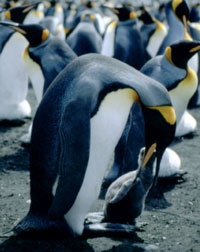Emerging Science Note/From the Belly of a Penguin
Air Date: Week of March 21, 2003
Living on Earth’s Maggie Villiger reports on how penguins can store food for weeks in their stomachs without it spoiling.
Transcript
 (Photo: Cécile Thouzeau) (Photo: Cécile Thouzeau) |
CURWOOD: Coming up, move over Land Rover. Common household products, including nail polish remover and deodorant, have moved right behind cars and trucks as the biggest source of pollution in the Los Angeles area.
First, this Note on Emerging Science from Maggie Villiger. [MUSIC: Science Note Theme] VILLIGER: Regurgitated food might not sound like an appetizing meal, but that's what king penguins feed their babies. Consider that the food these penguin kids are getting may have originally been eaten up to three weeks ago, and mealtime starts to sound even less appealing. But king penguins have a unique ability to keep undigested food fresh in their stomachs for weeks on end while they fast. And recently, researchers have been looking into just how the birds prevent food stored in their stomachs from going bad. They visited king penguin colonies in Antarctica where some males were fasting while incubating their eggs. The scientists took samples of the birds' stomach contents. They found that even though conditions like the temperature, pH and nutrients available inside the stomach were all favorable for bacterial growth, bacteria were not flourishing. In fact, dead or deformed bacteria and spores were much more common in the stomachs of penguins that were conserving food than they were in penguins that were digesting their meals. Scientists think penguin bellies contain an anti-microbial substance that helps keep food from spoiling. They hope to further test the birds' stomach contents to identify the anti-microbial substance and figure out how the penguins control these bacteria inhibitors. That's this week's Note on Emerging Science. I'm Maggie Villiger. CURWOOD: And you're listening to Living on Earth. [MUSIC: Cooder/Bhatt - Isa Lei “A Meeting by the River Water” Lily Acoustics (1993)] Living on Earth wants to hear from you!Living on Earth Newsletter [Click here]
Donate to Living on Earth! NewsletterLiving on Earth offers a weekly delivery of the show's rundown to your mailbox. Sign up for our newsletter today!
|





